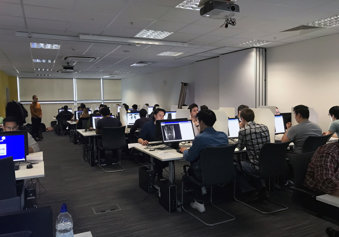Medical Training Initiative (MTI)
Update 19/12/2024: Change to the MTI application fee. From 6 January 2025 the application fees for the Medical Training Initiative (MTI) scheme will be revised.
About the scheme
Before beginning an MTI application, applicants and UK employers must read the Eligibility Criteria section to ensure that the applicant can meet the minimum eligibility requirements for the MTI, for General Medical Council (GMC) registration and for the Tier 5 visa.
- The scheme covers sponsorship for full GMC medical registration and for a Tier 5 visa - the College makes a recommendation for sponsorship to the GMC for full registration.
- The Academy of Medical Royal Colleges (AoMRC) is the national visa sponsors and issuers of the Certificate of Sponsorship (CoS) for the Tier 5 Visa.
- Sponsorship can only be offered for a job with a defined educational and training benefit to the applicant. The scheme should not be used to address workforce issues at a service level.
- The GMC only allows sponsorship on this basis, and our agreement with the GMC allows us to sponsor those who are working at specialty registrar level, using spare NHS training capacity.
- The Tier 5 visa can only be issued with confirmation that there is no suitable doctor from the UK or EEA to take up that job.
-
The scheme is not suitable for candidates who either have full FRCR or PLAB, and in this case a Tier 2 visa will be required.
-
Please note that MTI is not intended to provide a steppingstone to longer term employment in the UK under a Tier 2 visa.
- The MTI scheme cannot be used for GMC registration alone and all MTI applicants must apply for a Tier 5 visa.
Application process
Guidance for UK supervising consultants
Guidance for potential MTI applicants
In-post guidance
FAQs for UK employers
The primary purpose of the scheme is to improve the quality of healthcare in lower-income countries by sharing knowledge, experience, and best practise. This in turn benefits the doctor who is getting trained and developed in the NHS. The scheme also benefits the host hospital by making use of spare training capacity which can help to enhance patient care. MTI trainees bring diverse perspectives and can help promote cross-cultural understanding within departments. Their varied experiences can contribute to innovative approaches to healthcare and ultimately to improve the quality of care provided to patients.
- A job description that reflects the role is a training post
- A weekly timetable with limited on-call commitment. Where an on-call provision is included in the timetable there should be no expected inclusion in the out-of-hours on-call rota until the MTI doctor has been in post and assessed by the clinical supervisor as competent to be included.
- Confirmation of suitable induction and orientation period
- Confirmation that a named educational supervisor will be assigned to the trainee and they will receive appropriate supervision during their post.
No, but if they decide they do wish to gain this experience they should be remunerated for this work independently of any funding associated with the salary for the post.
It is important that trainees familiarise themselves with the hospital policies and procedures. As part of the induction process trainees receive training sessions specific to their role and clinical responsibilities. Trainees are allocated clinical and educational support from the start of their placement to ensure they receive comprehensive support and can focus on their training with confidence. They will meet with the educational supervisor every three months during the placement and their progress is monitored on the e-portfolio.
The MTI scheme facilitates access to world-class training facilities, allowing trainees to gain knowledge, skills and experiences to thrive in a globalised healthcare landscape. The initiative enriches host sites with new perspectives and allows them to contribute not only to the advancement of individual careers but also to improving healthcare access, quality, and outcomes for global populations. Being part of the MTI programme is a commitment to building stronger and more resilient healthcare systems around the world for future generations.
Please note
There are a limited number of Tier 5 visas available, across all specialties. Our MTI exists as part of our commitment to facilitate philanthropic international activity across both our faculties. When allocating visas, priority is given to applicants from lower and lower middle-income countries, as listed by the Department for International Development (DfID).
Although those from other countries can use the scheme, this approach is supported by us as the scheme is intended primarily for doctors from countries with less developed economies. For further information please visit the AoMRC website.
We sponsor on the understanding that MTI applicants will finish their placements and return to their home country at their conclusion. Any changes to the agreed post must be taken up with the RCR before they are implemented. A failure to do that may compromise our sponsorship and consequently the applicant's immigration status.
All enquiries regarding MTI should be emailed to the Training Administrator.
Our exams and training
Discover our resources on exams and training, which include help and guidance on taking the exams, alongside regulatory policies.
